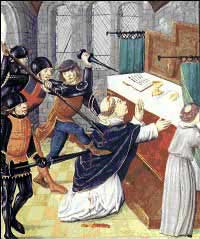
Thomas a Becket: Letter
 The Church and the Medieval Synthesis
the kingdom and may they be inviolably observed for ever.
The Church and the Medieval Synthesis
the kingdom and may they be inviolably observed for ever.
These are the words of the archbishop of Canterbury to the king of the English. With desire I have desired to see your face and to speak with you; greatly for my own sake but more for yours. For my sake, that when you saw my face you might recall to memory the services which, when I was under your obedience, I rendered faithfully and zealously to the best of my conscience . . . and that so you might be moved to pity me, who am forced to beg my bread among strangers; yet, thanks be to God, I have an abundance. . . . For your sake for three causes: because you are my lord, because you are my king, and because you are my spiritual son. In that you are my lord I owe and offer to you my counsel and service, such as a bishop owes to his lord according to the honor of God and the holy Church. And in that you are my king I am bound to you in reverence and regard. In that you are my son I am bound by reason of my office to chasten and correct you. . . . Christ founded the Church and purchased her liberty with His blood, undergoing the scourging and spitting, the nails, and the anguish of death, leaving us an example that we should follow in His steps. Whence also saith the apostle, "If we suffer with Him we shall also reign with Him. If we die with Him, with Him we shall rise again." The Church of God consists of two orders, clergy and people. Among the clergy are apostles, apostolic men, bishops, and other doctors of the Church, to whom is committed the care and governance of the Church, who have to perform ecclesiasticalbusiness, that the whole may redound to the saving of souls. Whence also it was said to Peter, and in Peter to the other rulers of the Church, not to kings nor to princes, "Thou art Peter, and upon this rock will I build my Church, and the gates of hell shall not prevail against it." Among the people are kings, princes, dukes, earls, and other powers, who perform secular business, that the whole may conduce to the peace and unity of the Church. And since it is certain that kings receive their power from the Church, not she from them but from Christ, so, if I may speak with your pardon, you have not the power to give rules to bishops, nor to absolve or excommunicate anyone, to draw clerks before secular tribunals, to judge concerning churches and tithes, to forbid bishops to adjudge causes concerning breach of faith or oath, and many other things of this sort which are written among your customs which you call ancient. Let my lord, therefore, if it pleases him, listen to the counsel of his subject, to the warnings of his bishop, and to the chastisement of his father. And first let him for the future abstain from all communion with schismatics. It is known almost to the whole world with what devotion you formerly received our lord the pope and what attachment you showed to the Church of Rome, and also what respect and deference were shown you in return. Forbear then, my lord, if you value your soul, to deprive that Church of her rights. Remember also the promise which you made, and which you placed in writing on the altar at Westminster when you were consecrated and anointed king by my predecessor, of preserving to the Church her liberty. Restore therefore to the Church of Canterbury, from which you received PART 4. The Church and the Medieval Synthesis your promotion and consecration, the rank which it held in the time of your predecessors and mine; together with all its possessions, townships, castles, and farms, and whatsoever else has been taken by violence either from myself or my dependents, laymen as well as clerks. And further, if so please you, permit us to return free and in peace, and with all security to our see, to perform the duties of our office as we ought. And we are ready faithfully and devotedly with all our strength to serve you as our dearest lord and king with all our strength in whatsoever we are able, saving the honor of God and of the Roman Church, and saving our order. Otherwise, know for certain that you shall feel the divine severity and vengeance.